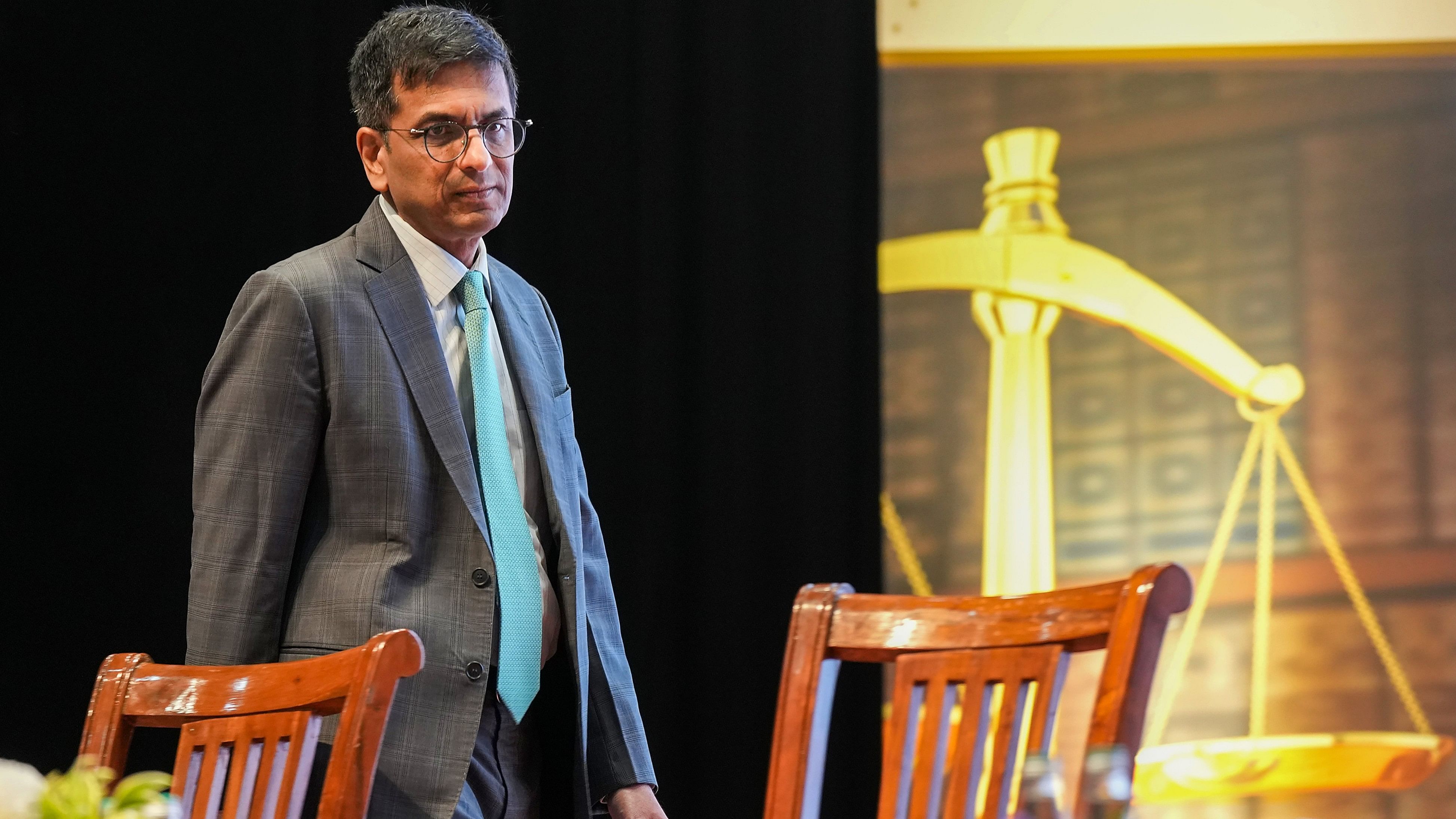
Chief Justice of India D Y Chandrachud at the 21st Biennial State Level Conference of Judicial Officers on the theme of 'Equity and Excellence for Futuristic Judiciary', in Bengaluru.
Credit: PTI Photo
New Delhi: Chief Justice of India D Y Chandrachud on Saturday underscored the transformative potential of Artificial Intelligence in legal research, describing it as a "game-changer" that empowered legal professionals with unmatched efficiency and accuracy. He stressed specific instances where AI, notably ChatGPT, had been utilised in court adjudication, citing examples from Colombia and India.
However, the CJI also raised a few cautionary flags. "The integration of AI in modern processes including court proceedings raises complex ethical, legal, and practical considerations that demand a thorough examination. The use of AI in court adjudication presents both opportunities and challenges that warrant nuanced deliberation," he asserted.
As we navigate the integration of AI into the legal domain, it is imperative that we remain vigilant in addressing the systemic challenges and ensuring that AI technologies serve to enhance, rather than undermine, the pursuit of justice for all, he said.
Referring to use of AI technology, he said, "the Supreme Court of India introduced live transcription services, an initiative aimed at enhancing accessibility to legal information. This initiative has been particularly impactful in addressing linguistic diversity, as live transcription services translate judicial proceedings into 18 regional languages and Hindi, ensuring that legal information is accessible to citizens across India."
The CJI was delivering a key-note address at a two-day conference on Technology and Dialogue between the Supreme Courts of India and Singapore on April 13 and 14. Chief Justice of Singapore Justice Sundaresh Menon, and several other judges and experts were also present during the conference.
Chandrachud noted the importance of transparency, accountability, and fairness in AI utilisation, highlighting concerns about potential errors and biases inherent in AI systems.
"Without robust auditing mechanisms in place, instances of 'hallucinations' – where AI generates false or misleading responses – may occur, leading to improper advice and, in extreme cases, miscarriages of justice," he said. Justice Chandrachud added that the impact of bias in AI systems presents a complex challenge, particularly when it comes to indirect discrimination.
He said in the realm of AI, indirect discrimination can manifest in two crucial stages — firstly, during the training phase where incomplete or inaccurate data may lead to biased outcomes and secondly, during data processing often within opaque 'black-box' algorithms that obscure the decision-making process from human developers.
Black box refers to algorithms or systems where the internal workings are hidden from users or developers, making it difficult to understand how decisions are made or why certain outcomes occur, he said.
The CJI said facial recognition technology serves as a prime example of high-risk AI, given its inherently intrusive nature and potential for misuse.
The CJI said, in the legal domain, the adoption of AI might accentuate inequality by favouring those with access to advanced technology but it also opens the door for new players and services, disrupting existing hierarchies.
Referring to the adoption of hybrid-mode hearings, which allow virtual participation, by the Supreme Court, he said that the apex court has removed geographical barriers and this democratised access to the apex court.
However, he highlighted how "the poor may find themselves relegated to inferior AI-driven assistance, while only affluent individuals or high-end law firms can effectively harness the capabilities of legal AI."
"Such a scenario risks widening the justice gap and perpetuating existing inequalities within the legal system,” he remarked.
The conference was being organised with an aim to explore the intersection of technology and the legal system, particularly focusing on the transformative role of Artificial Intelligence (AI) in the judiciary.
"The full realisation of AI's potential hinges on global collaboration and cooperation," Justice Chandrachud said.
The CJI pointed out that the advancement of technology and AI is inevitable.
"It holds the potential to significantly change professions and make service delivery more accessible to people. In the field of law, this translates to the potential for AI to expedite and streamline justice delivery. The era of maintaining the status quo is behind us; it is time to embrace evolution within our profession and explore how we can harness the processing power of technology to its fullest within our institutions," he said.
Capacity building and training play a crucial role in ensuring the ethical and effective utilisation of AI technologies and by investing in education and training programs, one can equip professionals with the knowledge and skills needed to navigate the complexities of AI, identify biases and uphold ethical standards in their use of AI systems, he said.
"As we navigate the integration of AI into the legal domain, it is imperative that we remain vigilant in addressing the systemic challenges and ensuring that AI technologies serve to enhance, rather than undermine, the pursuit of justice for all," he said.
The CJI said with a population of over a billion people and a rapidly growing economy, India presents enormous opportunities to adopt technology within the judicial system.
He referred to the e-Courts project and said it aims to computerise court processes, digitise case records and establish online case management systems across all levels of the judiciary.
(With PTI inputs)
